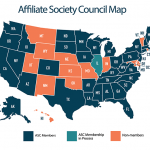I recall a telephone call from [ACR senior director of government affairs] Adam Cooper about three years ago that started, “Chris, we’d like you to consider being chair of the Affiliate Society Council (ASC).” I don’t specifically recall my reply to Adam, but I’m sure it was along the lines of, “Are you sure? Did you call the right Chris?” Little did I know that this phone call would lead to one of the most personally and professionally rewarding opportunities in my four decades of medical practice.

Dr. Chris Adams
Like many rheumatologists in busy clinical practice, I was very grateful for the ACR’s advocacy efforts, but I just “didn’t have time to get involved” in the mechanism supporting that advocacy. I had worked as a liaison between the Medical Association of the State of Alabama and the Alabama Society for the Rheumatic Diseases on an ad hoc basis, but meeting some of the ACR committee leaders convinced me that it was time to start giving back to the organization that was defending my practice and my patients against the onslaught of policies created by our healthcare delivery system.
The past three years have seen tectonic changes for healthcare delivery in general and rheumatology specifically. Fortunately, the ACR hired Joseph Cantrell, JD, as the senior manager of state affairs. Joseph seamlessly orchestrates advocacy at the state level, communicating with heads of state societies and state medical associations to advance the ACR’s advocacy goals. He has a gargantuan task but has done a herculean job of keeping up with, and responding to, legislative actions that affect rheumatology.
I have been amazed at the breadth and depth of state advocacy that the ACR has pursued. With the Coalition of State Rheumatology Organizations (CSRO) and other advocacy partners, the College has pursued legislative and regulatory efforts across the nation, from Florida to South Dakota and Oregon to New York. The ASC had a hand in legislation affecting step-edit therapy, biosimilar substitution, pharmacy benefit manager (PBM) transparency and workforce issues in Alabama, Arkansas, Colorado, Georgia, Louisiana, New York, Ohio, Oregon, South Dakota, Tennessee, Virginia and Washington. Acting on behalf of the College, the ASC has supported and helped pass legislation that promotes development of pediatric rheumatology programs, patient access to affordable biologic treatments and removal of restrictive administrative barriers to telemedicine during the COVID-19 pandemic.
But we cannot rest on our laurels. Our future as rheumatologists holds both challenges and opportunities. Workforce issues are paramount, and efforts must continue at the state level to prevent scope creep that allows less-trained clinicians to provide the expert management that requires sub-specialty certification, while facilitating incorporation of nurse practitioner and physician assistant physician extenders in practices where needed to enhance patient care and meet demand in the face of the rheumatologist shortage. The ASC should continue to promote pediatric rheumatology loan forgiveness programs and state incentives that improve rural access to rheumatology services. The ASC should also promote state efforts to increase PBM transparency so that companies and individuals purchasing these plans can see how their resources are spent. Other ongoing patient advocacy goals include supporting state measures that promote biosimilars for cost savings and the regulation of economically driven step-edit policies. States should be encouraged to limit PBM-imposed copay accumulator policies that increase patient out-of-pocket expenses for needed treatment.

